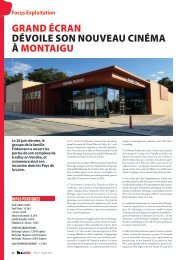You also want an ePaper? Increase the reach of your titles
YUMPU automatically turns print PDFs into web optimized ePapers that Google loves.
I<br />
0.<br />
Will<br />
'<br />
I<br />
A MANUAL OF PREVENTIVE<br />
MAINTENANCE FOR THE THEATRE<br />
THEATRE<br />
ELECTRICAL SYSTEM<br />
C. Power Factor. Is system overload due to low power factor?<br />
Can synchronous motors or capacitors be employed<br />
economically to correct this condition?<br />
B. Control. Are controls located for maximum saving in steps?<br />
For convenient control of mechanical devices (clutches,<br />
valves, levers, hopper gates, etc.)? Are orfHitintiMi<br />
* ^^^^'<br />
I<br />
Metering. Are several units served and metered separately?<br />
common service and common metering reduce<br />
power costs and upkeep? Will department metering<br />
provide valuable operating data?<br />
E. Demand Control. Will demand recording and alarm devices<br />
permit power cost economies?<br />
starting, stopping or jogging stations advantageous? ~ _...<br />
Are safety disconnects provided at out-of-slght motors? „<br />
Are remove load indicating ammeters needed? Are<br />
several motors interdependent?<br />
Will outage be avoided<br />
if electrically Interlocked for: Sequence starting?<br />
Tripping? Group starting? Are controller<br />
locations upon (permanent supF>orts?<br />
Free of vibration?<br />
Isolated from Injury?<br />
F. Off Peak Control. Are certain units operable only during offpeak<br />
hours? Can separate feeders be arranged for<br />
their sub-metering?<br />
G. Service Clearances. Is present service too low?<br />
Subject to accidental damage? Are overhead spans<br />
obstructing traffic? Do they Interfere with firemen?<br />
Do they need re-wiring and new supports?<br />
Will new underground runs prevent shutdown? Reduce<br />
hazards?<br />
Are wall-bracketed runs interfering with<br />
exterior operations?<br />
C. Accessibility. Do present wiring connections Interfere with:<br />
Motor removal?<br />
Belt or chain adjustments?<br />
Switch or starter operations? Resistor cleaning?<br />
Starter maintenance?<br />
13. LIGHTING SYSTEM WIRING<br />
A. Wattage Provisions. Are feeders and circuits adequate for<br />
providing correct wattage throughout the theatre?<br />
Is spare future capacity provided for?<br />
H. Feeder Flexibility. Are the theatre machinery layouts changed<br />
often? Can wiring be provided readily?<br />
Do changes involve: Expensive feeder alterations?<br />
Dangerous temporary work? Expensive cutting or<br />
drilling?<br />
Capacity limitations?<br />
I. Load Centers. Can feeders be redistributed for minimum<br />
subfusing maintenance? Are load centers: Readily accessible<br />
for maintenance? Isolated from avoidable<br />
moisture? Fumes? Dust? Corrosion?<br />
Mechanical injury?<br />
J. Load Balance. Are circuit connections evenly balanced on<br />
outer poles of 115/230 volt DC? 3-Phase, 4-Wire?<br />
Miscellaneous polyphase?<br />
K. Underground Systems. Are manholes and hand holes accessible<br />
for cable repairs and conductor replacement?<br />
Are<br />
walls and covers in good order?<br />
How about drainage?<br />
Is ventilation good?<br />
B. Outlet Locations. Have outlets been provided for: General<br />
distribution reflectors? Local units? High<br />
bay units?<br />
Watchman or cleaning lights?<br />
Yard lights? Pit lights? Gauges and Indicators?<br />
Exits and stairs? Portables?<br />
Pilots?<br />
Are these outlets correctly located?<br />
C. Maintenance. Are lighting units: Accessible or adjustable<br />
for cleaning? Lamping? Guarded?<br />
Self -leveling? Vibration insulated? Thief protected?<br />
D. Control Are outlets controlled from: Panelboard?<br />
Wall switches? Ceiling pulls? At sockets?<br />
Are manual or remote-controlled master switches<br />
practical for large groups, with several control stations?<br />
3-way switching? 4-way? Lock switches?<br />
Indicating lamp annunciators?<br />
Are lights<br />
being wasted through lack of convenient controls?<br />
Lack of pilots? Are fire exits on separate emergency<br />
throwover controls?<br />
12. MOTOR AND CONTROL WIRING<br />
A. Efficiency. Can largest motor be started satisfactorily when<br />
other motors are running?<br />
Are motors so wired that<br />
interruptions from excessive overloads interrupt other important<br />
motor operations? Can motor or control repairs<br />
be made safely without working "hot" group feeders?<br />
Can motors be rearranged without expensive delays?<br />
Dangerous temporary work?<br />
Are portable motors operable<br />
without employing excessive lengths of cords?<br />
WUl cable reeling devices methods reduce time and interruptions?<br />
E. Wiring Devices. Are switches capable of controlling lamps of<br />
high wattage inrush? How are plates insulated?<br />
Have heavy duty industrial type receptacles and plugs<br />
been installed?<br />
Do they provide grounding protection?<br />
Are sockets and switches loose, flickerj- or faulty?<br />
Are devices rugged enough to withstand abuse? „<br />
F. Voltage. Are automatic regulating devices provided to protect<br />
against wide voltage variations?<br />
Continued next month<br />
BOXOFHCE December 6, 1952 25

















